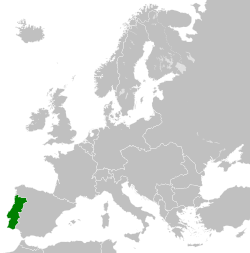Portuguese Republic República Portuguesa (Portuguese) | |||||||||
|---|---|---|---|---|---|---|---|---|---|
| 1910–1926 | |||||||||
| Motto: Ordem e Trabalho ("Order and Work") | |||||||||
| Anthem: A Portuguesa ("The Portuguese") | |||||||||
 The Portuguese Republic in 1914 | |||||||||
| Capital | Lisbon | ||||||||
| Common languages | Portuguese[1] | ||||||||
| Demonym(s) | Portuguese | ||||||||
| Government | Unitary parliamentary republic (1910–1918, 1918–1926) Unitary parliamentary republic under a Sidonist presidential regime (1918) | ||||||||
| President | |||||||||
• 1911–1915 (first) | Manuel de Arriaga | ||||||||
• 1925–1926 (last) | Bernardino Machado | ||||||||
| Prime Minister | |||||||||
• 1911 (first) | João Pinheiro Chagas | ||||||||
• 1925–1926 (last) | António Maria da Silva | ||||||||
| Legislature | Congress of the Republic | ||||||||
• Upper house | Senate | ||||||||
• Lower house | Chamber of Deputies | ||||||||
| Historical era | World War I, Interwar | ||||||||
| 5 October 1910 | |||||||||
| 21 August 1911 | |||||||||
| 29 May 1926 | |||||||||
| Currency | Portuguese real (1910–1911) Portuguese escudo (1911–1926) | ||||||||
| |||||||||
| History of Portugal |
|---|
 |
| Timeline |
|
|
The First Portuguese Republic (Portuguese: Primeira República Portuguesa; officially: República Portuguesa, Portuguese Republic) spans a complex 16-year period in the history of Portugal, between the end of the period of constitutional monarchy marked by the 5 October 1910 revolution and the 28 May 1926 coup d'état. The latter movement instituted a military dictatorship known as Ditadura Nacional (national dictatorship) that would be followed by the corporatist Estado Novo (new state) regime of António de Oliveira Salazar.
The sixteen years of the First Republic saw eight presidents and 45 ministries, and were altogether more of a transition between the Kingdom of Portugal and the Estado Novo than they were a coherent period of governance.
- ^ (in Continental Portugal, Madeira and Azores, official in the Portuguese Empire)

